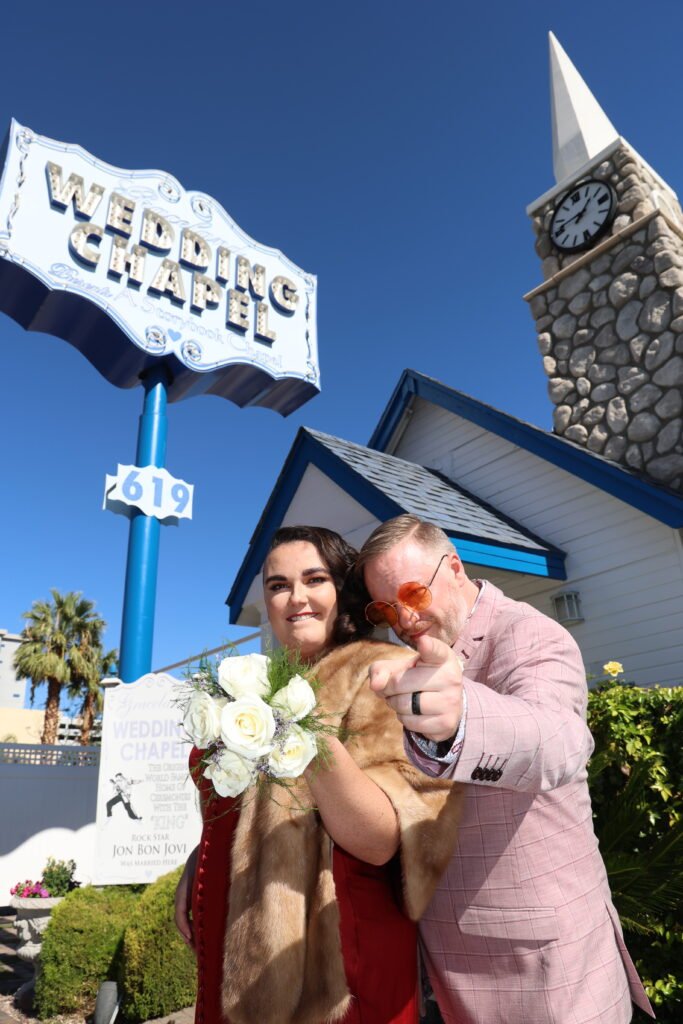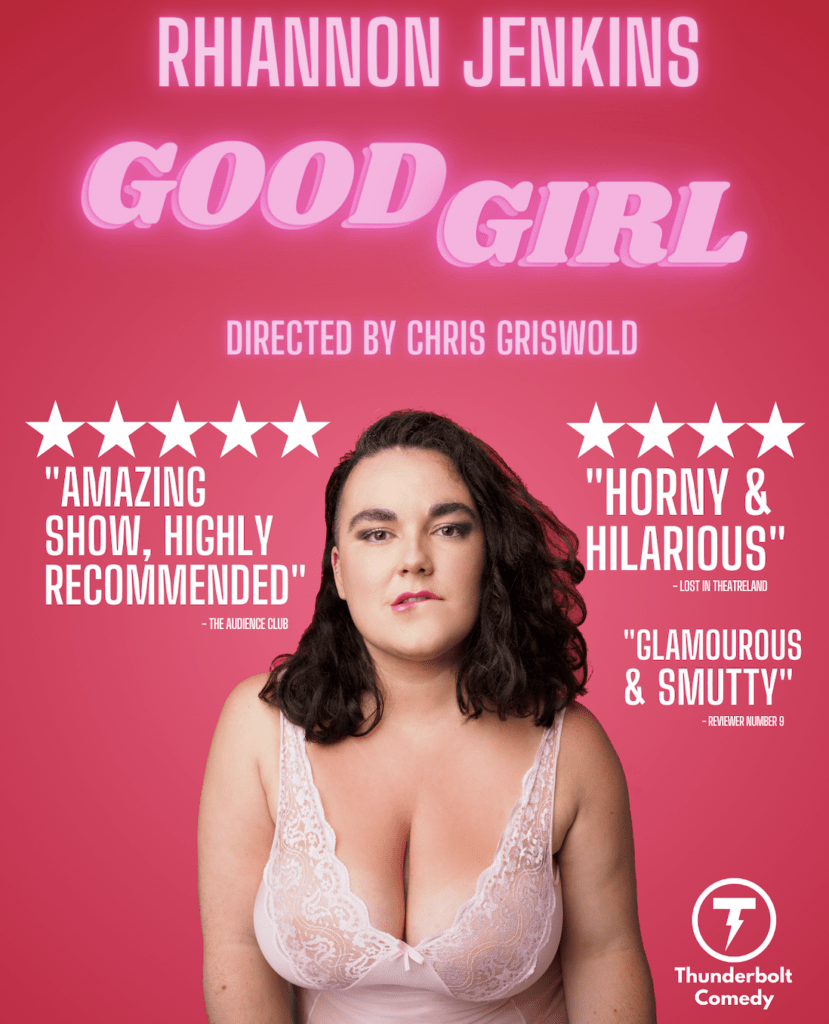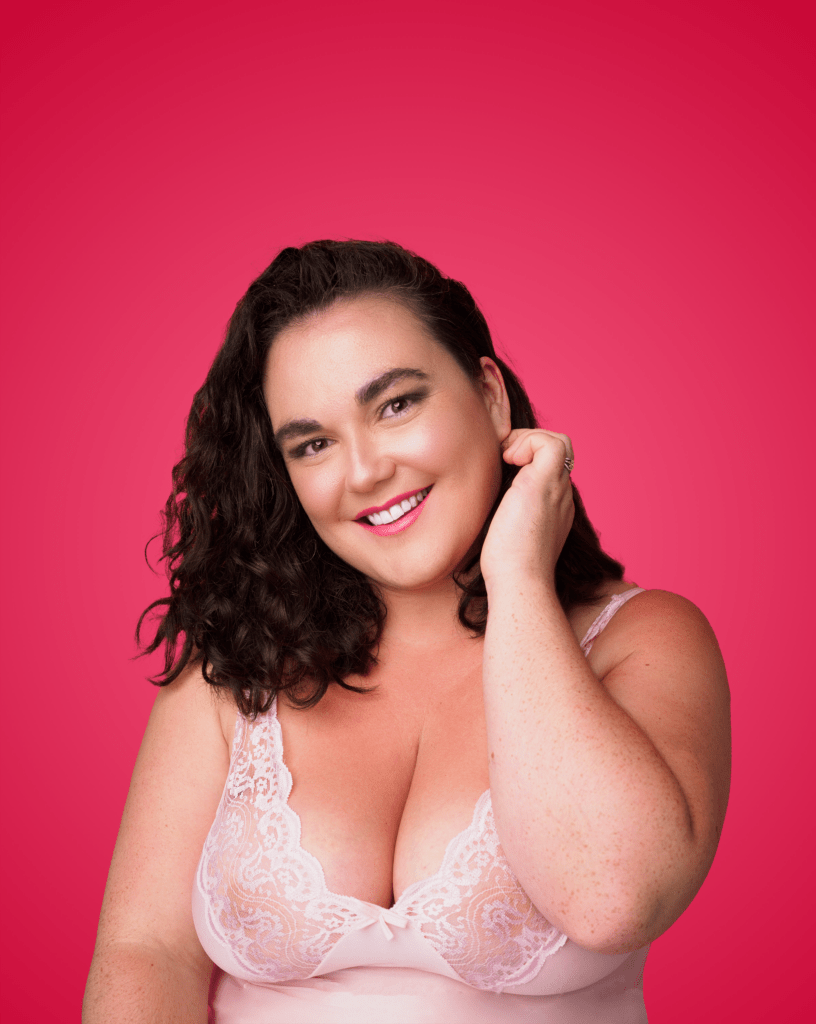Griswold-Jenkins’ New Show Is Sexual Education and Couples Therapy, But Funny

Christopher Griswold-Jenkins and his wife, Rhiannon Jenkins, are very open about discussing sexual fantasies. They’re so comfortable that they created the live comedy show Good Girl to explore female sexuality under the male gaze.
Griswold-Jenkins, Assistant Director for Comedic Arts, directs Rhiannon, who wrote and stars in the interactive play. They’ve been touring the show since last year, and in August, Good Girl will be featured next month at the Edinburgh Festival Fringe.
When talking, the couple’s rapport is evident. This is the first time they’ve worked professionally with each other, and it’s easy to see how together they created a thought-provoking, improvised one-person show.
The two talked with Emerson Today from their home in between touring the show around the world.
What is Good Girl about?
Jenkins: It is first, about male fantasies about women, and how women navigate thinking around male fantasies.
Griswold-Jenkins: It’s very much about the female experience …
Jenkins: … to appeal to the male gaze.
Griswold-Jenkins: The character tries to find power she has over men, but still in a structure that is controlled by men. In the show, we look at male sexual fantasies and what is sexy about those things, grotesque about them, and the reality of what the people would be doing if the fantasy were real. What would it mean? Who is the teacher who hits on their young female student?
Why is it called Good Girl?
Jenkins: We’re trying to convey the idea that women are trying to be this perfect woman. A lot of women in straight relationships, in my experience, or relationships with men in general, are contorting to whatever their partner wants from them instead of … discussing their own desires. It’s trying to get someone to say, ‘Good girl, you’ve done what I want you to do.’
An example of a fantasy we play out is the sexy school girl. It’s all tropes from porn and TV. The play starts pretty on the nose, with me playing those porn tropes or sexy TV tropes. But with the school girl, we look at, what if you’re sexualizing underage girls? What does that actually mean?
Griswold-Jenkins: It’s kind of taking apart and dissecting what that phrase, ‘good girl,’ means on some level.
Jenkins: There is a lot of audience interaction. Each scenario I take someone from the audience, ‘It seems like you’d be someone into this,’ and get them to act it out with me.
Griswold-Jenkins: You get to see a man being uncomfortable on stage in a scenario he’d otherwise be very excited by. It’s a mix of sketch comedy and parody songs, burlesque, drag, and improv. We have a lot of scripted material that may not show up in a show. It depends upon the audience. Sometimes interactions create a unique version of that particular show that only that audience will see.

How did you come up with the show?
Jenkins: I was 30, writing a show looking back at my 20s and teenage years in the ways [that] I succeeded and failed being a sexual person and navigating that with men. My sister is 10 years younger me, and she was about to go to university. What are the things I hoped she’d get to try out and the pitfalls I hope she’d avoid?
The big thing for me is having agency over your desires and interests. Often men express their desires. This is very generalized: Men feel equipped to discuss their desires in sex and relationships, and women often feel their job is to fulfill those desires and needs. But they don’t think a huge amount about their own needs and desires, and how those two things can overlap.
It was like an amalgamation of dealing with men in general, and thinking about how younger women, particularly my sister, I’d like to feel more empowered. We landed on running with these tropes of male fantasies of women, but having the character be very in control, [then] not in control, then back to being in control and being in charge of what she wants. After talking to men for the entire show, I then talk to women in the show, and ask, ‘What do you want?’ Certainly, women closer to my age, the answers are, ‘I don’t know. A guy who listens to me,’ or ‘A guy who makes me [orgasm].’ Wow, the bar is really low.
Griswold-Jenkins: Women are wearing themed lingerie and not having orgasms. That’s quite the disparity. It’s changed a lot from performance to performance, and after every festival we’ve performed, we rewrite, and ask how can we make it more specific, more committed, and an experience people aren’t going to have anywhere else. A plan is to tour with this and get it front of people as sexual education, and as mental health education.
Jenkins: We just performed in Rhode Island a few weeks ago, and a guy came up and said he had felt guilty about his sexual fantasies. We are just opening a conversation that’s always kept fun. One of the things important to us is that everyone in the audience feels safe from beginning to end, even as we nudge at that safety a little bit, and nudge at scary ideas.
Griswold-Jenkins: This show really does what I want comedy to do, which is to safely process information. I see comedy as an inoculation against tragedy, and way to get rid of cognitive dissonance.
Do you think people have had more fun sex after the show?
Griswold-Jenkins: I hope so.
Jenkins: Yes, from women we’ve talked to, especially if a woman feels comfortable with it. If this is something you want, maybe there’s someone in the audience who can help with that. I’d like to think people are starting conversations.
Griswold-Jenkins: You’ve played matchmaker with the show a little bit.
Jenkins: In our last show at Newport, there was a couple there, and the woman in the couple answered when I was asking what women want. She said she wants someone who washes dishes. I had brought [her partner] up for [male] fantasies. I then said [to him], ‘You’ve got highfalutin’ fantasies and you can’t wash the dishes for your girlfriend!’ It was playful, he was laughing and didn’t feel scolded. Sometimes, those sorts of conversations can be fraught, but if done in a playful way, it’s easier to talk about.
Have you worked with each other before?
Jenkins: Not to any big degree. This is the first big project together. We travel around to improv festivals and we’ve talked at some festivals on panels together. Only recently [have] we started teaching together. We’ve done a handful of improvised shows, but they’re last-minute. This is the first thing we’ve worked on consistently as an ongoing project. We also have ideas for other things.
Griswold-Jenkins: Our skills are complimentary. My background is from New York City and comedy, and I have focused on technical aspects of comedy to help people get their voice out. Rhiannon is from the Royal Central School of Speech and Drama. She’s London-trained in musical theatre.

There are witty musical parodies? Of what songs?
Jenkins: The show starts with “Friend Like Me” from Aladdin. It’s “You’ve Never Had a Girl Like Me.’ It’s like I’m a genie, I’m going to grant all your sexual wishes.
Griswold-Jenkins: It ends with a parody of “Part of Your World” from The Little Mermaid.
Jenkins: It’s about having my own desires and wants.
Griswold-Jenkins: There’s a great parody of “We Didn’t Start the Fire”.
You’ve performed the play in 12 different countries. How does touring help the show? And it will be featured in the Edinburgh Fringe Festival 2024?
Griswold-Jenkins: It’s only October since I [began working] at Emerson. We’ve been able to create a settled life and live in the same place. We’re bringing it to Boston [later this year]. We’re expanding our reach with it as we go. Edinburgh is a laboratory to develop the show. We want to get it in front of people who can extend what we’ve done.
Jenkins: There are a lot of producers and bookers at Edinburgh. Bookers go there to see what they’re going to book for the next year. For the U.K., and a lot of the U.S. on the East Coast, theatre producers, and TV producers go there to watch. We’re hoping we can get people to review the show and get more positive feedback.
Why is the topic(s) of the show important to the Emerson community?
Griswold-Jenkins: For students, they’re starting to navigate sexuality in adulthood. I think this is a way for somebody to really engage with what things really mean to them, instead of how they fit into existing structures. ‘How do I move things forward’ versus ‘How do I fit in?’ That’s very Emerson to me.
How does this experience help you in terms of your job at Emerson?
Griswold-Jenkins: I think our Comedic Arts program in particular — so much is focused on professional experience and active learning. I think it’s important for me to have as much experience in the world of comedy as possible. I’ve been performing comedy for 27 years. [Edinburgh Festival Fringe is a festival] that a lot of people want to be able to be featured in. I think it’s incredibly useful for a comedy career. We’re preparing our students not to just be artists, but be professional.
Categories